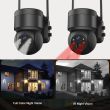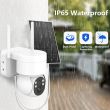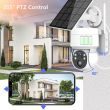WiFi solar CCTV cameras work by combining several technologies to provide wireless, solar-powered surveillance capabilities. Here's a simplified overview of how they function:
1. Solar Power Generation:
These cameras are equipped with built-in solar panels, which capture sunlight and convert it into electrical energy. The solar panels charge an internal battery or capacitors, which store the energy for later use.
2. Battery or Capacitor Storage:
The captured solar energy is stored in a rechargeable battery or a capacitor. This stored energy is essential to power the camera, especially during periods of low sunlight or nighttime.
3. Camera Operation:
The camera itself is designed to be energy-efficient. It typically operates in a standby mode when not actively recording or transmitting data, conserving energy. When motion is detected or when scheduled recording is activated, the camera switches to an active mode to capture and transmit video and audio.
4. Motion Detection and Recording:
Many WiFi solar CCTV cameras have motion sensors that detect movement in their field of view. When motion is detected, the camera begins recording and can also send alerts to the user through a mobile app or email notification. Some models offer continuous recording as well.
5. Wireless Communication:
These cameras are equipped with WiFi modules, allowing them to connect to your home or office's WiFi network. This connection enables the camera to transmit video and audio data wirelessly to your network and the internet.
6. Remote Access:
Users can access the camera's live feed and recorded footage remotely using a mobile app or a web browser. This allows you to monitor the camera's feed from anywhere with an internet connection.
7. Storage Options:
Some WiFi solar CCTV cameras include options for local storage, typically through a microSD card slot. This allows you to store recorded footage on the camera itself. Alternatively, cloud storage solutions may also be available for saving video footage online.
8. Solar Recharging:
The camera's solar panels continue to charge the internal battery or capacitor during daylight hours. This sustainable power source ensures that the camera remains operational even in off-grid or remote locations.
9. Weatherproof Design:
These cameras are often designed to withstand outdoor conditions, with weatherproof housing that protects them from rain, wind, and extreme temperatures.
10. Optional Connectivity:
In addition to WiFi, some models may offer 4G or 5G connectivity options, which can be beneficial in areas with unreliable or no WiFi coverage.
Overall, WiFi solar CCTV cameras are a versatile and eco-friendly solution for remote surveillance. They are particularly useful in areas without access to traditional power sources and can provide continuous monitoring while minimizing the need for physical maintenance and power supply management.














